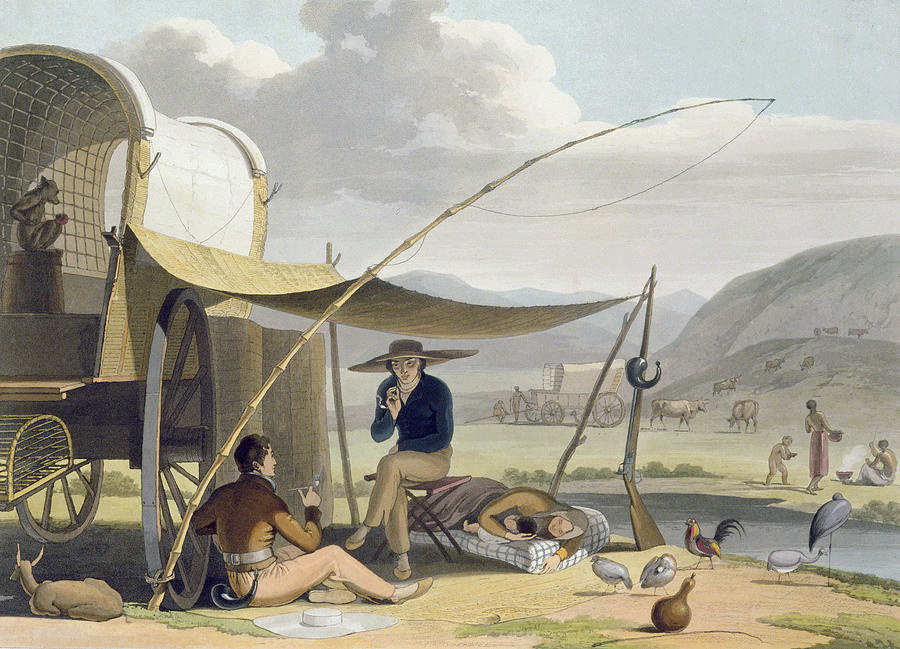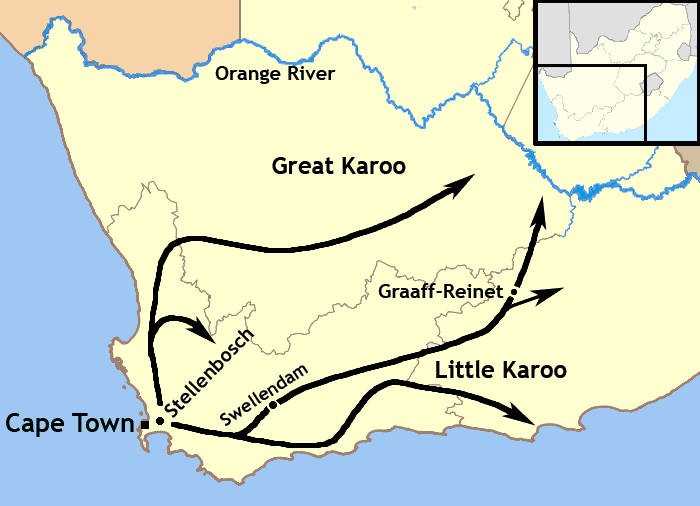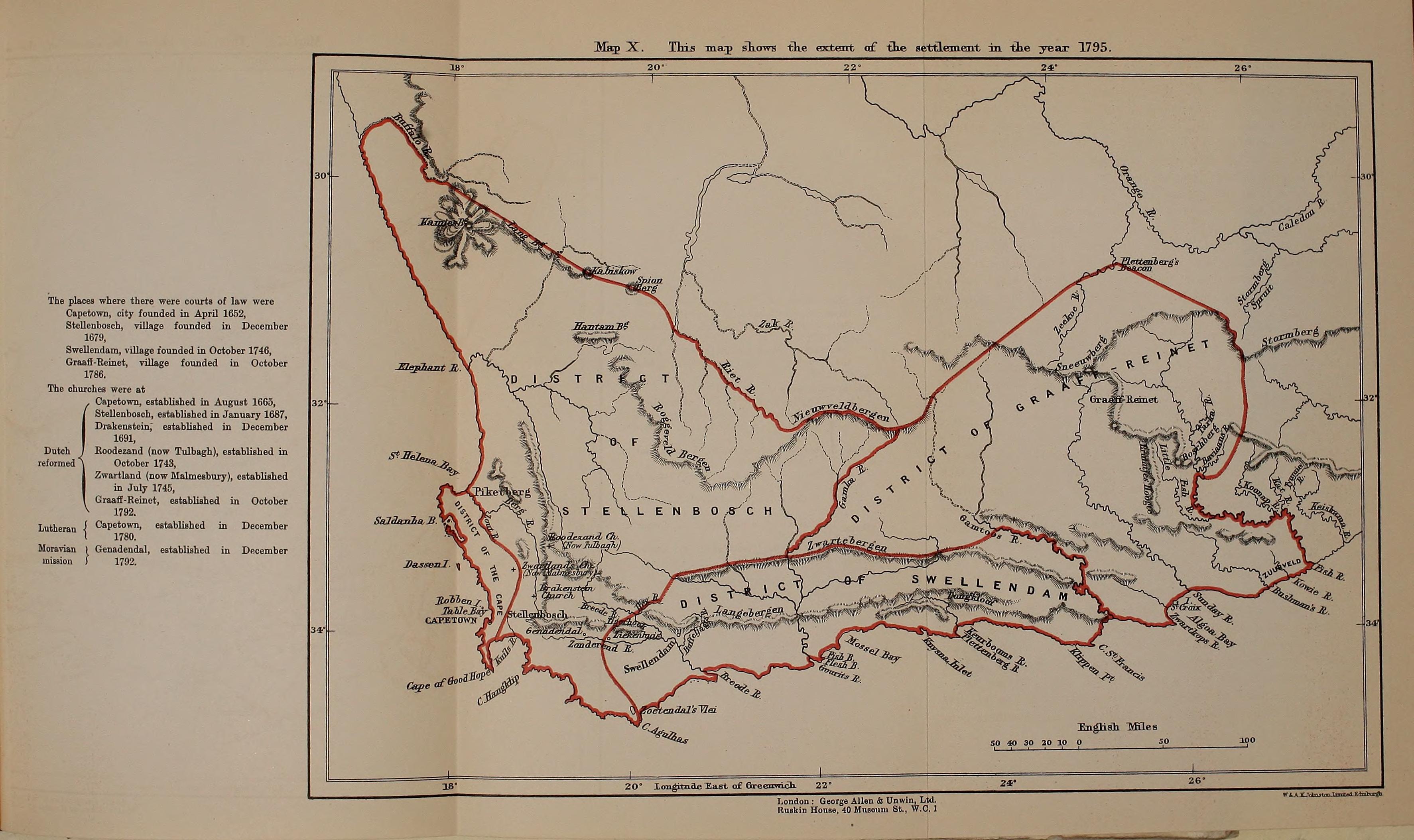|
Trekboers
The Trekboers ( af, Trekboere) were nomadic pastoralists descended from European settlers on the frontiers of the Dutch Cape Colony in Southern Africa. The Trekboers began migrating into the interior from the areas surrounding what is now Cape Town, such as Paarl (settled from 1688), Stellenbosch (founded in 1679), and Franschhoek (settled from 1688), during the late 17th century and throughout the 18th century. The Trekboer includes mixed-race families of partial Khoikoi descent that had also become established within the economic class of burghers. Origins The Trekboers were seminomadic pastoralists, subsistence farmers who began trekking both northwards and eastwards into the interior to find better pastures/farmlands for their livestock to graze, as well as to escape the autocratic rule of the Dutch East India Company (or VOC), which administered the Cape. They believed the VOC was tainted with corruption and not concerned with the interests of the free burghers, the so ... [...More Info...] [...Related Items...] OR: [Wikipedia] [Google] [Baidu] |
Khoikoi
Khoekhoen (singular Khoekhoe) (or Khoikhoi in the former orthography; formerly also '' Hottentots''"Hottentot, n. and adj." ''OED Online'', Oxford University Press, March 2018, www.oed.com/view/Entry/88829. Accessed 13 May 2018. Citing G. S. Nienaber, 'The origin of the name “Hottentot” ', ''African Studies'', 22:2 (1963), 65-90, . See also . ) are the traditionally nomadic pastoralist indigenous population of southwestern Africa. They are often grouped with the hunter-gatherer San (literally "Foragers") peoples. The designation "Khoekhoe" is actually a ''kare'' or praise address, not an ethnic endonym, but it has been used in the literature as an ethnic term for Khoe-speaking peoples of Southern Africa, particularly pastoralist groups, such as the !Ora, !Gona, Nama, Xiri and ǂNūkhoe nations. While the presence of Khoekhoen in Southern Africa predates the Bantu expansion, according to a scientific theory based mainly on linguistic evidence, it is not clear w ... [...More Info...] [...Related Items...] OR: [Wikipedia] [Google] [Baidu] |
Xhosa Wars
The Xhosa Wars (also known as the Cape Frontier Wars or the Kaffir Wars) were a series of nine wars (from 1779 to 1879) between the Xhosa Kingdom and the British Empire as well as Trekboers in what is now the Eastern Cape in South Africa. These events were the longest-running military action in the history of European colonialism in Africa. The reality of the conflicts between the Europeans and Xhosa involves a balance of tension. At times, tensions existed between the various Europeans in the Cape region, tensions between Empire administration and colonial governments, and tensions within the Xhosa Kingdom, e.g. chiefs rivalling each other, which usually led to Europeans taking advantage of the situation to meddle in Xhosa politics. A perfect example of this is the case of chief Ngqika and his uncle, chief Ndlambe. Background The first European colonial settlement in modern-day South Africa was a small supply station established by the Dutch East India Company in 16 ... [...More Info...] [...Related Items...] OR: [Wikipedia] [Google] [Baidu] |
Great Karoo
The Karoo ( ; from the Afrikaans borrowing of the South Khoekhoe !Orakobab or Khoemana word ''ǃ’Aukarob'' "Hardveld") is a semi-desert natural region of South Africa. No exact definition of what constitutes the Karoo is available, so its extent is also not precisely defined. The Karoo is partly defined by its topography, geology and climate, and above all, its low rainfall, arid air, cloudless skies, and extremes of heat and cold.Potgieter, D.J. & du Plessis, T.C. (1972) ''Standard Encyclopaedia of Southern Africa''. Vol. 6. pp. 306–307. Nasou, Cape Town.''Reader’s Digest Illustrated Guide to Southern Africa''. (5th Ed. 1993). pp. 78–89. Reader’s Digest Association of South Africa Pty. Ltd., Cape Town. The Karoo also hosted a well-preserved ecosystem hundreds of million years ago which is now represented by many fossils. The ǃ’Aukarob formed an almost impenetrable barrier to the interior from Cape Town, and the early adventurers, explorers, hunters, and travelers o ... [...More Info...] [...Related Items...] OR: [Wikipedia] [Google] [Baidu] |
Little Karoo
The Karoo ( ; from the Afrikaans borrowing of the South Khoekhoe !Orakobab or Khoemana word ''ǃ’Aukarob'' "Hardveld") is a semi-desert natural region of South Africa. No exact definition of what constitutes the Karoo is available, so its extent is also not precisely defined. The Karoo is partly defined by its topography, geology and climate, and above all, its low rainfall, arid air, cloudless skies, and extremes of heat and cold.Potgieter, D.J. & du Plessis, T.C. (1972) ''Standard Encyclopaedia of Southern Africa''. Vol. 6. pp. 306–307. Nasou, Cape Town.''Reader’s Digest Illustrated Guide to Southern Africa''. (5th Ed. 1993). pp. 78–89. Reader’s Digest Association of South Africa Pty. Ltd., Cape Town. The Karoo also hosted a well-preserved ecosystem hundreds of million years ago which is now represented by many fossils. The ǃ’Aukarob formed an almost impenetrable barrier to the interior from Cape Town, and the early adventurers, explorers, hunters, and travelers o ... [...More Info...] [...Related Items...] OR: [Wikipedia] [Google] [Baidu] |
Daniell Trekboer
Daniell is a surname. Notable people with the surname include: * Alexander Daniell (1599–1668), Cornish landowner * Alfred Daniell (1853–1937) * Ave Daniell (1914–1999), American (gridiron) footballer * Charles Daniell (1827–1889), Major-General, British Army * David Daniell (author) (1929–2016), biographer of William Tyndale * David Daniell (cyclist) (born 1989), English competitive cyclist * David Daniell (musician) (born 1972), American guitarist and composer * David Scott Daniell (1906–1965) * Edward Daniell (cricketer) (1815–1875), English cricketer * Edward Thomas Daniell (1804–1842), English landscape painter and etcher * Francis Henry Blackburne Daniell (1845 – 10 February 1921) was an Anglo-Irish barrister and historian * Geoffrey Daniell (1516–1586) * George Daniell (medical doctor) (1864–1937), medical practitioner and anaesthesiologist * George Daniell (photographer) (1911-2002), American photographer * George Daniell (priest) (1853–1 ... [...More Info...] [...Related Items...] OR: [Wikipedia] [Google] [Baidu] |
Trekboer Migration Map
The Trekboers ( af, Trekboere) were nomadic pastoralists descended from European settlers on the frontiers of the Dutch Cape Colony in Southern Africa. The Trekboers began migrating into the interior from the areas surrounding what is now Cape Town, such as Paarl (settled from 1688), Stellenbosch (founded in 1679), and Franschhoek (settled from 1688), during the late 17th century and throughout the 18th century. The Trekboer includes mixed-race families of partial Khoikoi descent that had also become established within the economic class of burghers. Origins The Trekboers were seminomadic pastoralists, subsistence farmers who began trekking both northwards and eastwards into the interior to find better pastures/farmlands for their livestock to graze, as well as to escape the autocratic rule of the Dutch East India Company (or VOC), which administered the Cape. They believed the VOC was tainted with corruption and not concerned with the interests of the free burghers, the so ... [...More Info...] [...Related Items...] OR: [Wikipedia] [Google] [Baidu] |
Slachter's Nek Rebellion
The Slachter's Nek Rebellion was an uprising by Boers in 1815 on the eastern border of the Cape Colony. Background In 1815 a farmer from the eastern border of the Cape Colony, Frederik Bezuidenhout, was summoned to appear before a magistrate's court after repeated allegations of mistreating one of his Khoi labourers. Bezuidenhout resisted arrest and fled to a cave near his home, where he defended himself against the Coloured soldiers sent to capture him. When he refused to surrender, he was shot dead by one of the soldiers. Uprising Hendrik Prinsloo, along with a neighbor Hans Bezuidenhout organised an uprising against the British colonial authority, which was believed, by the Boers (Afrikaner farmers) to be hostile towards themselves and to favour Blacks and Coloureds above the Afrikaner farmers. The Boers also had more than 3,600 cattle stolen and felt the British were not doing enough to protect them from the attacks by the Xhosas. On 18 November a commando of rebels met an a ... [...More Info...] [...Related Items...] OR: [Wikipedia] [Google] [Baidu] |
French Revolutionary Wars
The French Revolutionary Wars (french: Guerres de la Révolution française) were a series of sweeping military conflicts lasting from 1792 until 1802 and resulting from the French Revolution. They pitted France against Britain, Austria, Prussia, Russia, and several other monarchies. They are divided in two periods: the War of the First Coalition (1792–97) and the War of the Second Coalition (1798–1802). Initially confined to Europe, the fighting gradually assumed a global dimension. After a decade of constant warfare and aggressive diplomacy, France had conquered territories in the Italian Peninsula, the Low Countries and the Rhineland in Europe and abandoned Louisiana in North America. French success in these conflicts ensured the spread of revolutionary principles over much of Europe. As early as 1791, the other monarchies of Europe looked with outrage at the revolution and its upheavals; and they considered whether they should intervene, either in support of King ... [...More Info...] [...Related Items...] OR: [Wikipedia] [Google] [Baidu] |
Invasion Of The Cape Colony
The Invasion of the Cape Colony, also known as the Battle of Muizenberg, was a British military expedition launched in 1795 against the Dutch Cape Colony at the Cape of Good Hope. The Dutch colony at the Cape, established and controlled by the United East India Company in the seventeenth century, was at the time the only viable South African port for ships making the journey from Europe to the European colonies in the East Indies. It therefore held vital strategic importance, although it was otherwise economically insignificant. In the winter of 1794, during the French Revolutionary Wars, French troops entered the Dutch Republic, which was reformed into the Batavian Republic. In response, Great Britain launched operations against the Dutch Empire to use its facilities against the French Navy. The British expedition was led by Vice-Admiral Sir George Keith Elphinstone and sailed in April 1795, arriving off Simon's Town at the Cape in June. Attempts were made to negotiat ... [...More Info...] [...Related Items...] OR: [Wikipedia] [Google] [Baidu] |
Kingdom Of Great Britain
The Kingdom of Great Britain (officially Great Britain) was a sovereign country in Western Europe from 1 May 1707 to the end of 31 December 1800. The state was created by the 1706 Treaty of Union and ratified by the Acts of Union 1707, which united the kingdoms of England (which included Wales) and Scotland to form a single kingdom encompassing the whole island of Great Britain and its outlying islands, with the exception of the Isle of Man and the Channel Islands. The unitary state was governed by a single parliament at the Palace of Westminster, but distinct legal systems – English law and Scots law – remained in use. The formerly separate kingdoms had been in personal union since the 1603 " Union of the Crowns" when James VI of Scotland became King of England and King of Ireland. Since James's reign, who had been the first to refer to himself as "king of Great Britain", a political union between the two mainland British kingdoms had been repeatedly at ... [...More Info...] [...Related Items...] OR: [Wikipedia] [Google] [Baidu] |
French Directory
The Directory (also called Directorate, ) was the governing five-member committee in the French First Republic from 2 November 1795 until 9 November 1799, when it was overthrown by Napoleon Bonaparte in the Coup of 18 Brumaire and replaced by the Consulate. ''Directoire'' is the name of the final four years of the French Revolution. Mainstream historiography also uses the term in reference to the period from the dissolution of the National Convention on 26 October 1795 (4 Brumaire) to Napoleon's coup d’état. The Directory was continually at war with foreign coalitions, including Britain, Austria, Prussia, the Kingdom of Naples, Russia and the Ottoman Empire. It annexed Belgium and the left bank of the Rhine, while Bonaparte conquered a large part of Italy. The Directory established 196 short-lived sister republics in Italy, Switzerland and the Netherlands. The conquered cities and states were required to send France huge amounts of money, as well as art treasures, which ... [...More Info...] [...Related Items...] OR: [Wikipedia] [Google] [Baidu] |
Batavian Republic
The Batavian Republic ( nl, Bataafse Republiek; french: République Batave) was the successor state to the Republic of the Seven United Netherlands. It was proclaimed on 19 January 1795 and ended on 5 June 1806, with the accession of Louis Bonaparte to the Dutch throne. From October 1801 onward, it was known as the Batavian Commonwealth ( nl, Bataafs Gemenebest). Both names refer to the Germanic tribe of the ''Batavi'', representing both the Dutch ancestry and their ancient quest for liberty in their nationalistic lore. In early 1795, intervention by the French Republic led to the downfall of the old Dutch Republic. The new Republic enjoyed widespread support from the Dutch populace and was the product of a genuine popular revolution. However, it was founded with the armed support of the French revolutionary forces. The Batavian Republic became a client state, the first of the " sister-republics", and later part of the French Empire of Napoleon. Its politics were deeply i ... [...More Info...] [...Related Items...] OR: [Wikipedia] [Google] [Baidu] |






